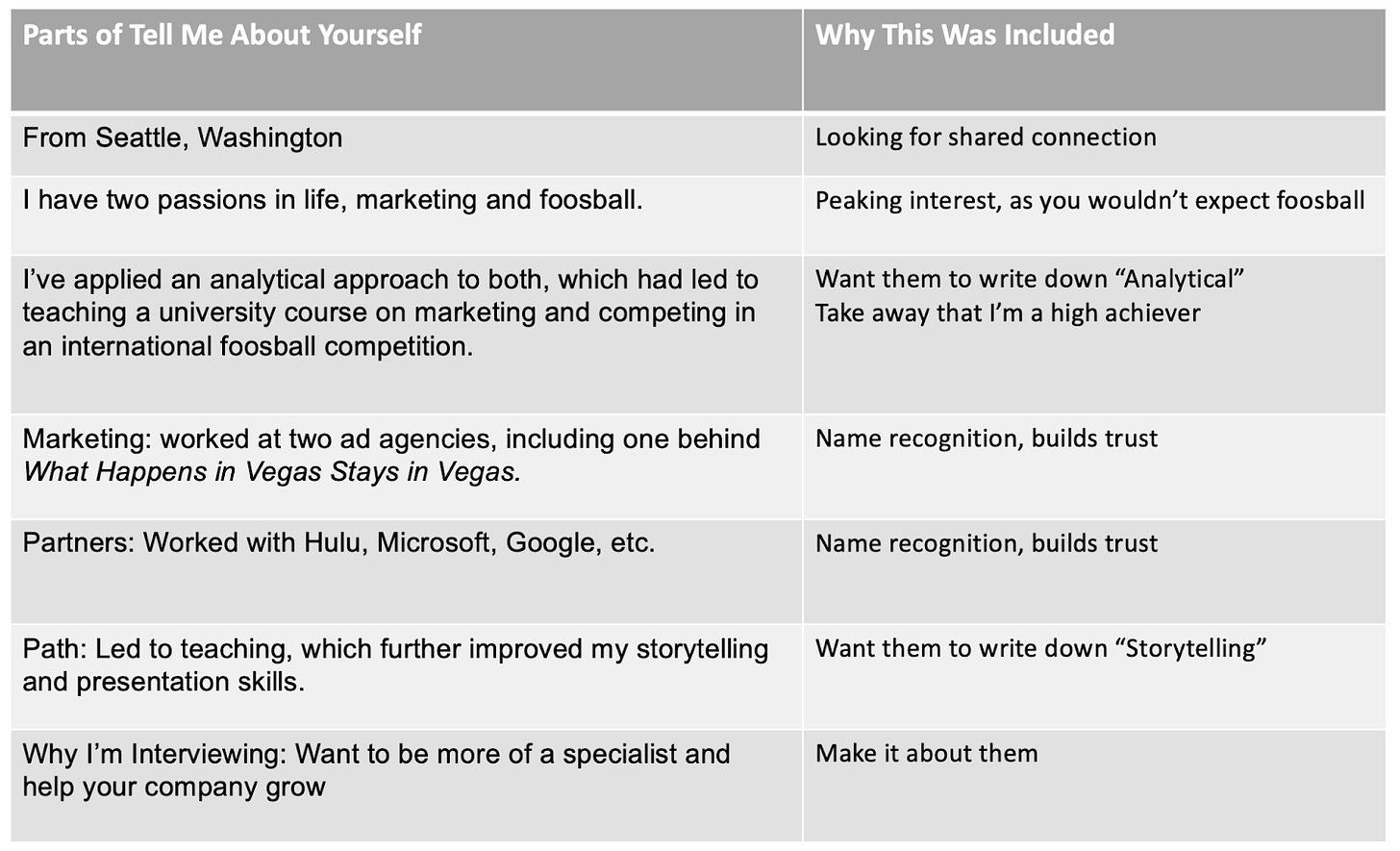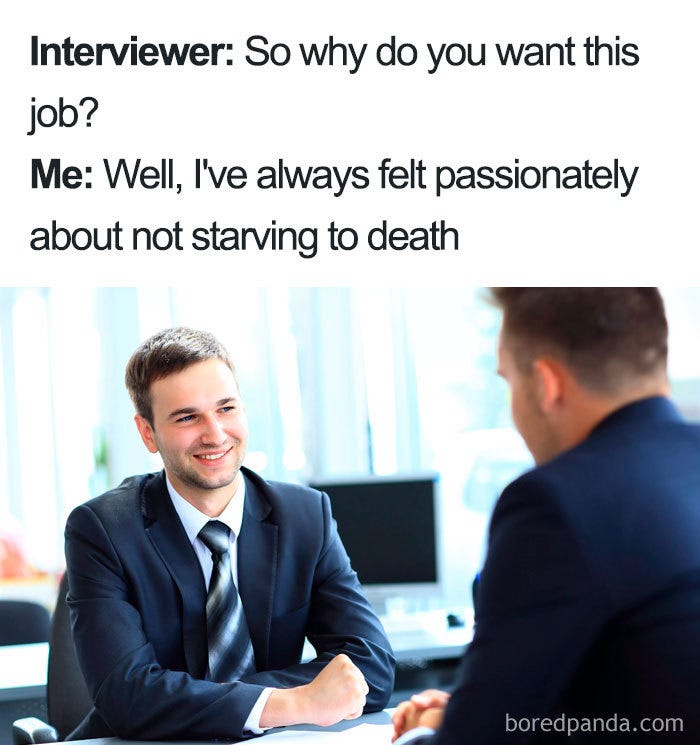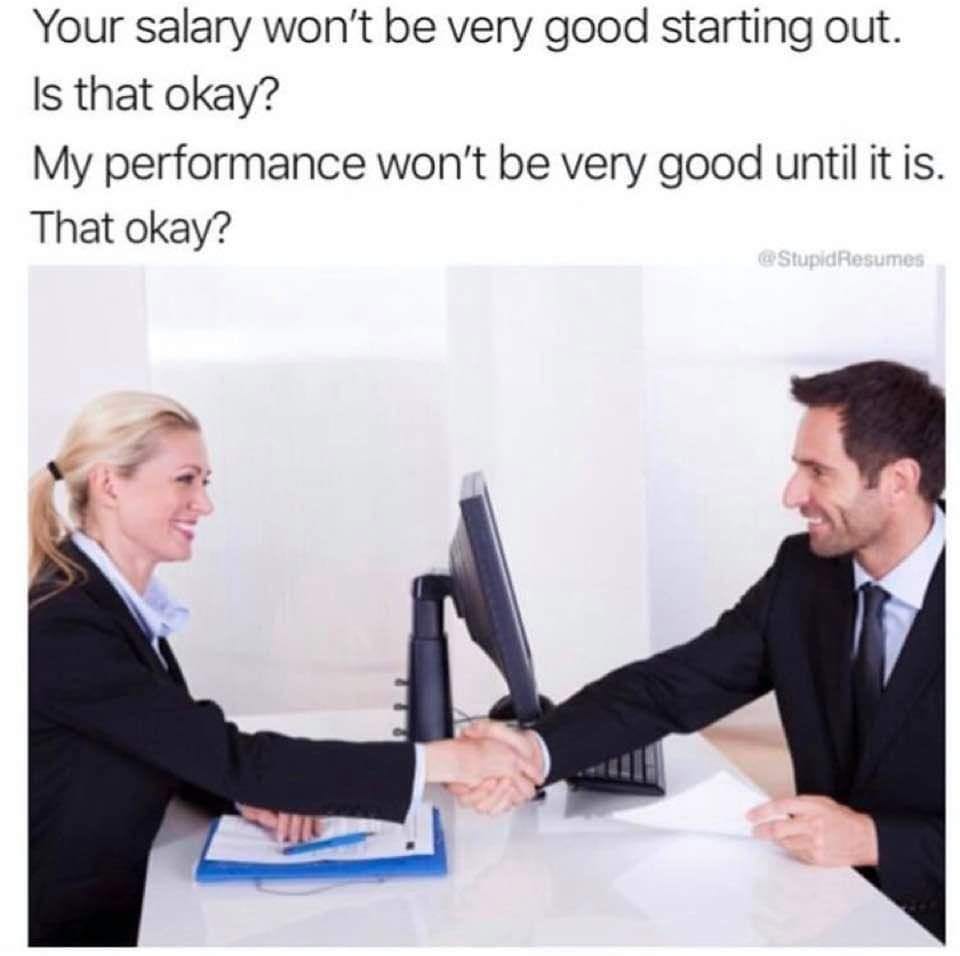Interviewing doesn’t have to be scary, especially if you follow the formula
I had a good friend reach out and set up a mock interview with me. It had been 10 years since he had interviewed for a job… and he had one scheduled for the following week. He was rusty.
During our mock interview, which we did via FaceTime and was a good mix of real interview questions and us breaking character and laughing, one thing was made crystal clear to me:
However charismatic, well-accomplished, or confident you are, there are some essential steps to interviewing that need to be followed to be successful.
This guide provides the formula.
Interviewing: The Formula
Interviews nearly all follow a formula in terms of cadence and expectations. Here it is:
- Greet / Pleasantries
- Statement by Interviewer
- Tell Me About Yourself
- Tell Me About Your Role/Company
- A Story-Based Question
- A Story-Based Question
- Why Are You Interested in this Role?
- Any Questions?
However formal or informal your interview is, what industry it is, what level position you’re interviewing for, or any other factor it will almost always have most of these pieces.
And your interviewer(s) are almost always familiar with your resume/background and looking for things related to the job description. They also usually take notes.
Why this matters: since you know the formula, you can prepare! Let’s get started.
Tell Me About Yourself: The Hardest Question Ever Asked
Ah, the icebreaker question! It comes in many different forms with how it is asked but it’s always looking for a few things, namely some background information, your work experience, and what type of person you are.
Back when I was interviewing a lot in grad school I actually gained a reputation for having a really good Tell Me About Yourself. The school liked it so much that they recorded my answer and use it to teach MBA students today, and you can watch it here.

Here’s my answer from 5 years ago summarized below with why I included it:

Hopefully you can see how deliberate this is. Those who just make up this answer on the spot are just shooting themselves in the foot, as before you know it you’re talking about your cats (from an actual interview I did) or showing grill tongs (also from an interview I did).
In this part of the interview you really just want your interviewer(s) to be interested in you, be memorable, and set up what could be a great interview. If they stop you to ask questions, that’s how you know you’re winning. Back then I would say about half of my interviews this single question would take up 15 minutes, as we’d start talking about Seattle, professional foosball, Las Vegas, adjunct teaching, Hulu, or some other topic.
The interviewer is also looking to understand what makes you tick. I was deliberate in having them understand I was analytical, a storyteller, and a high achiever.
Lastly, you want to end this part by making it about them. It should almost feel like your life has built for this moment to be a perfect fit for the role you’re interviewing for, and the discussion should shift towards them and the company.
How to prepare: write out your answer, similar to the table above. Practice it!
Expected Questions: You Shouldn’t Be Surprised!
Interviews have a number of expected questions, much like Tell Me About Yourself. These include:
- Tell Me About Your Role/Company
- Why Are You Interested in this Role?
- Any Questions?
Unsurprisingly, these are questions YOU KNOW will be asked and consequently you should prepare for. Here’s some tips for each question:
Tell Me About Your Role/Company. Here you should be specific and paint a picture of your role. Be generous and honest – this is an interview after all! Also remember that since they are taking notes, you’ll want to consider what you want them to take away. For example, if you are a marketer you could focus on all the changes you have made to increase marketing effectiveness.
Why Are You Interested in this Role? To rock this question you should have done your homework on the company/role beforehand (a helpful article on how to do this is The Unwritten Guide to Job Searching: How to Find a New Job in 8 Hours). Normally you should only go into an interview after having talked with people at the company, and should be prepared on why you’re a good cultural fit, excited about where the company is headed, and the team you’d be joining. This is where you can set yourself apart from other candidates.

Any Questions? The worst thing you can do here is say that you don’t have any questions. Interviews are for both you and the interviewer! Your questions here should be thoughtful and helpful for you. Here’s some great questions to ask:
- Why did you join this company? What do you enjoy the most?
- What do you see someone in this role doing in their first 100 days?
- Why do you recommend working here?
How to prepare: again, write out your answers here! I generally will even bring a notebook to my interviews where I can take notes and have my questions written out.
Behavioral Questions: The Most Feared Questions
Behavioral questions are the questions that most people dread. They usually start with “Tell me about a time when…” and will have some sort of specific situation the interview is asking about.
Here’s the trick: you can prepare for these regardless of the question being asked. I generally recommend a PAR (Problem / Action / Solution) story to answer these.
Problem – set up the problem at hand (1-2 sentences)
Action – what you did to solve the problem (main answer)
Solution – what happened as an outcome (1-2 sentences)
These can be really powerful. Here’s an example of how to answer the question “Tell me about a time you exceeded expectations in your role?”
Problem – My company sold widgets that weren’t selling well, which is a problem since we didn’t have any more products coming out for nearly a year.
Action – I put together a marketing campaign around these products. I worked cross-functionally between finance, sales, product, and the marketing team to put together a campaign called “Wow Widgets”, which highlighted the product benefits and community members that used it. This was proactive and I hit a number of roadblocks, but was able to launch it within three weeks where a normal marketing campaign takes months.
Solution – We increased sales by 30% that month and had the most profitable quarter in the past 3 years.
These responses should be 1-2 minutes, and the most important part is to end on a high note since that’s what the interviewer will write down. This last part people struggle with as they want to say more and they shouldn’t (it just erodes your story).
What’s helpful to know is that if you have 4-6 stories like this prepared in advance they will work for 99% of behavioral questions. You can nearly always tailor a question with a prepared response. This also helps boost your confidence going in and during the interview.
How to prepare: write out 4-6 PAR stories before your interview. Included at the end of this article are some common behavioral questions.
How to Talk About Salary, Relocation, and Hard Topics

One of the parts we get asked about the most is how to negotiate salary, relocation, or other hard topics. What’s nice is the answer is relatively straightforward:
You shouldn’t.
In a first interview you’re getting the company to fall in love with you. If they start asking these questions that’s a great sign they are interested, but not one you should discuss in your first interview! Instead, you should say something to the effect of “That’s a great question. I’m definitely open to discuss this further into the interview process” or “I’m very interested in working here and understand compensation is a full package, so once I fully understand the role, team, and everything your company has to offer that will be a more productive discussion.”
Also generally if you’re asked about relocation, your interest in working at the company, etc. your answer should always be HECK YES! You can actually decide down the road whether you’re open to relocating or working at the company, but you shouldn’t be deliberating that in the interview. Wait until you have an offer in hand and then you can decide.
I have moved for various jobs when I wasn’t particularly interested initially in moving to that city (ex: Minneapolis is very cold), but I’m so glad I did. I’m glad I didn’t hesitate in the interview process. Equally there have been job offers I have received that I chose not to take, but I felt like I needed all the information (including the offer) to make that decision.
In summary: don’t discuss salary in a first interview, and when asked other hard questions you should be agreeable.
Conclusion
Interviewing doesn’t have to be scary if you’re prepared. Interviewing is a dance that can be practiced and perfected, which can lead to many interesting career opportunities.
And remember, you should always send a pie after your interview.
If you need help in your job search, here are some additional resources:
The Unwritten Guide to Job Searching: How to Find a New Job in 8 Hours
The Unwritten Guide to Resume Writing: How to Rewrite Your Resume in 61 Minutes
Why Choosing Your Boss Is Probably Your Best Career Strategy

Appendix: Common Behavioral Questions
- Describe a situation in which you were able to use persuasion to successfully convince someone to see things your way
- Describe a time when you were faced with a stressful situation and how you dealt with it
- Give me a specific example of a time when you used good judgment and logic in solving a problem
- Give me an example of a time when you set a goal and were able to meet or achieve it
- Give me a specific example of a time when you had to conform to a policy with which you did not agree
- Tell me about a time when you had to go above and beyond the call of duty in order to get a job done
- Tell me about a time when you had too many things to do and you were required to prioritize your tasks
- Give me an example of a time when you had to make a split second decision
- What is your typical way of dealing with conflict? Give me an example.
- Tell me about a time you were able to successfully deal with another person even when that individual may not have personally liked you (or vice versa).
- Tell me about a difficult decision you’ve made in the last year
- Give me an example of a time when something you tried to accomplish failed
- Give me an example of when you showed initiative and took the lead
- Tell me about a situation in which you had to deal with a very upset customer or coworker
- Give me an example of a time when you motivated others
- Tell me about a time when you delegated a project effectively
- Give me an example of a time when you used your analytical skills to solve a problem
- Describe a time when you anticipated potential problems and developed preventive measures
- Tell me about a time when you were forced to make an unpopular decision
- Give me an example of a time when you used your strategic skills to solve a problem


